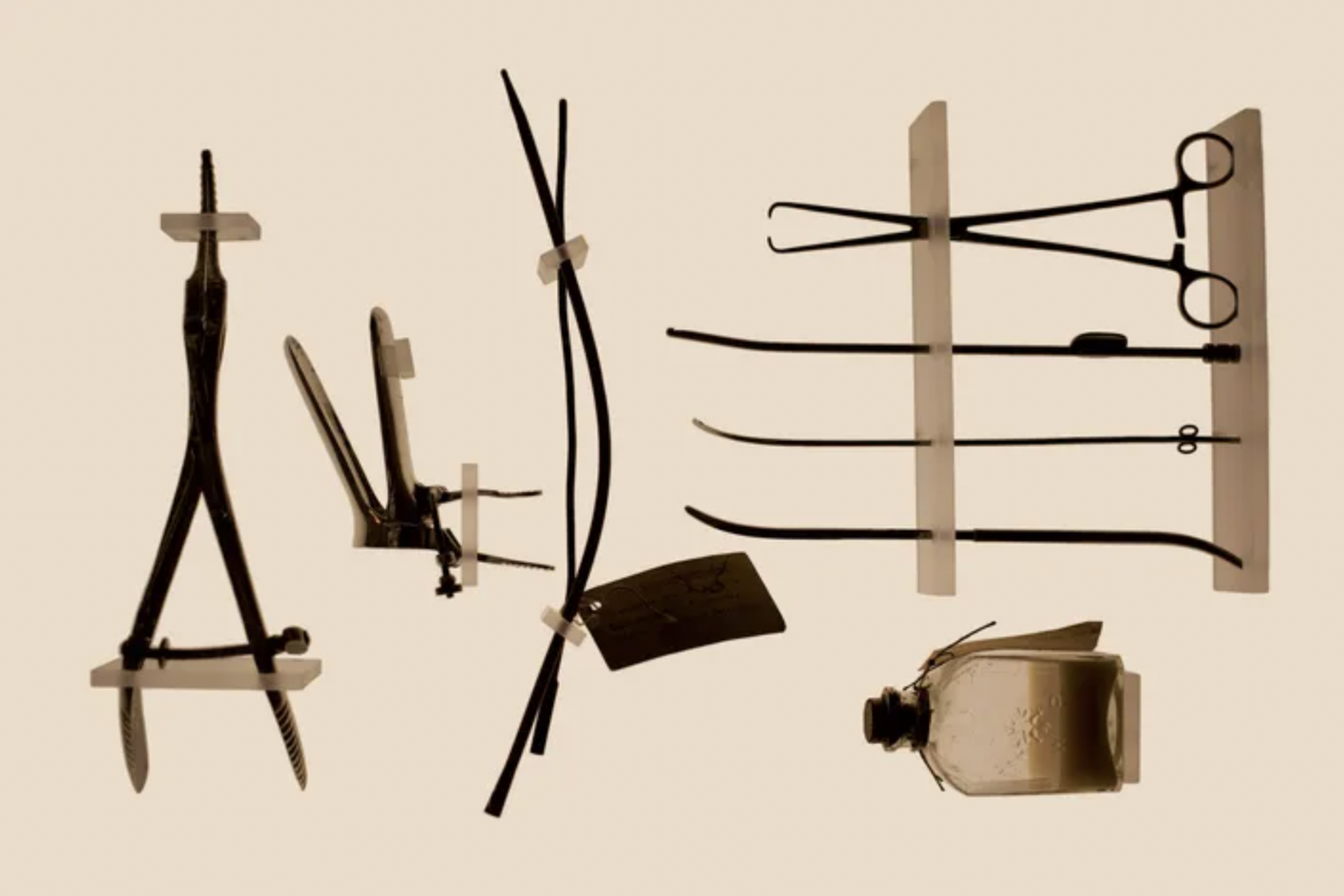Abortion instruments. Photo credit: unknown.
On January 20, 1871, 20-year-old Adelaide “Addie” Hand had an abortion. Eighteen days later, she died of a massive pelvic infection, and her doctor went on trial for murder.
Born in Connecticut in 1851, Addie came to San Francisco and married Joseph Hand, likely in the late 1860s. They lived at 333 Clementina St., now the site of a downtown parking lot, and on July 14, 1869, Addie gave birth to their daughter, May Emily Hand.
The Hands were poor, and both of them worked, Addie as a housekeeper, Joseph as a grocer. So when Addie got pregnant again at the end of 1870, she knew they wouldn’t be able to support another child. She contacted Dr. Charles C. O’Donnell, a known abortion doctor in the city, and he performed the procedure on January 20.
O’Donnell told her “if that did not have the desired effect to come again in a few days,” Addie’s sister-in-law, Victoria, testified in February. Addie felt as though it hadn’t worked. Victoria asked if she would go back to O’Donnell, and “she said she certainly would.” When Victoria asked why Addie didn’t want to become a mother again, Addie said, “her husband could not afford it.” And when Victoria asked if Joseph knew, “she said no, and that she would not tell him until it was all over.”
Addie returned to O’Donnell, who attempted another abortion. After the abortions, O’Donnell told Addie “to take care of herself not to take cold, and not to pat her hands in cold water.” But still she became sick. In the following days, Addie began throwing up and experiencing “a good deal” of abdominal pain, according to testimony from her friend, Jennie West. When West asked if there was anything they could do, O’Donnell suggested laudanum and the application of “hot fermentations” to her abdomen. But only after some prodding. At first, when Addie told him she felt “very bad and weak,” he told her “she needed nothing, as she was getting along nicely.”
Five days later, on February 7, she was dead; initially, her cause of death was given as “congestive chills.”
In the 19th century, abortion procedures could be dangerous. Herb-induced abortions were practiced for centuries, and generally safely, but those performed with contemporary surgical instruments often led to infection, and frequently infertility or death. After all, germ theory wasn’t widely known, and antibiotics weren’t yet available. Abortion was illegal in California during Addie Hand’s lifetime, although early abortion laws were largely in place to protect women from medical malpractice. After the 1850s, though, the laws became about prosecuting and punishing women.
If she’d had her abortion today, in a state where the procedure is illegal, her ability to get proper medical care for post-abortion complications would depend largely on her income, ability to travel, and access to good doctors.
O’Donnell was arrested February 10, and a coroner’s inquest began February 12. Addie’s body was exhumed from its resting place in Odd Fellows Cemetery and examined by Coroner Jonathan Letterman and Dr. Edwin Beatty. Letterman testified that Addie had been six to eight weeks pregnant, although there was no sign of the fetus, just a portion of the placenta.
“In the cavity of the abdomen were found from four to six ounces of pus and serum, the lining of the membrane peritoneum showing that there had been a high degree of inflammation, also in the intestines; the ovaries were both filed with pus; there was a large sack of pus in the pelvis,” according to Letterman’s testimony. “The death of the woman was, in my opinion, caused by the intense inflammation of the womb and other viscera of the abdomen.”
There wasn’t much further coverage of the case, but according to a later article about O’Donnell, he was acquitted of all abortion-related charges he faced in his lifetime. Unfortunately, O’Donnell was also deeply involved in stirring up anti-Chinese racism in San Francisco, and his qualifications as a doctor were also questioned. He claimed he learned his surgery skills during the Civil War, where he amputated soldier’s limbs under the authority of General Robert E. Lee.
By 1891, O’Donnell was wealthy enough to build a “luxurious” summer home, called Cozy Castle, in Glen Ellen, in California’s wine country. He also built an extensive mineral springs resort along Sonoma Creek nearby. He died in May, 1912, at the age of 77.
Sources:
1870 United States Federal Census
U.S., Find a Grave Index, 1600s-Current
“Murder.” Daily Alta California, Volume 23, Number 7630, 11 February 1871
“Abortion— Murder.” Daily Alta California, Volume 23, Number 7631, 12 February 1871
“Abortion,” Daily Alta California, Volume 23, Number 7640, 21 February 1871
“Dr. Charles C. O’Donnell,” Glen Ellen Historical Society website, accessed June 24, 2022
To read the full articles listed above, click here.
